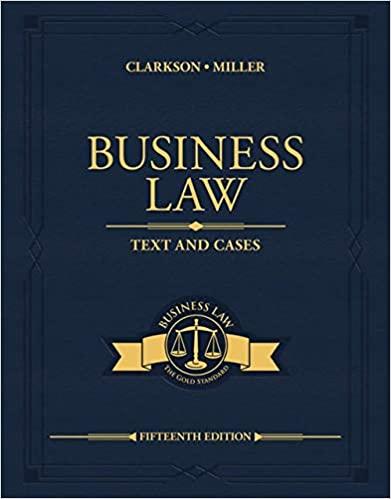Question
1. This case looks at the 4th and 5th Amendments. Firstly, the arrest warrant that Alan obtained was unreasonable because he knew Ivan was not
1. This case looks at the 4th and 5th Amendments. Firstly, the arrest warrant that Alan obtained was unreasonable because he knew Ivan was not reliable. Secondly, the undercover officer pushed Debbie into making self-incriminating statements. The undercover boss could have just listened to Debbie instead of trying to push her to make these self-incriminating statements. After the undercover officer arrested Debbie for considering hiring someone to kill her husband, he then searched her. The undercover officer did not give Debbie her Miranda Rights after he had arrested her. The undercover officer had an obligation to give Debbie the Miranda Rights before arresting and interrogating her. The undercover officer interrogated her when he asked her, "What do we have here?" He asked this without giving Debbie her Miranda Rights so, she did not know she can remain silent or request a lawyer. These Miranda Rights are given to individuals charged with a crime to know their rights of being appointed counsel, remaining silent, and anything they say can and will be held against them in the court of law. Because the undercover officer didn't give Debbie the Miranda Rights, then Debbie's post-arrest statements are inadmissible in the court of law. Another reason why the post-arrest statement is inadmissible, is because the arrest warrant wasn't taken with probable cause because the informant, Ivan, wasn't reliable. The Fourth Amendment requires an informant to be reliable to create probable cause for an arrest warrant. For these two reasons, Debbie's post-arrest statements would be inadmissible.
reply to the comment above.
2. I believe that Debbie's post-arrest statement should not be admissible as evidence of her guilt. The Fifth Amendment guarantees the right to a grand jury, forbids double jeopardy, and protects against self-incrimination. Debbie is protected under the self-incrimination clause in the Fifth Amendment. Another reason why Debbie's statement should be inadmissible as evidence is because Bob the police officer did not warn Debby of her rights. Bob should have stated Debbie's Miranda rights. The Miranda rights state that the person has the right to remain silent, anything that they say can be used against them at trial, they have the right to speak to an attorney, and if they cannot afford an attorney one will be appointed to them. Debbie had a right to know her Fifth Amendment privileges against self-incriminating statements before waiving her rights. A case that supports this is Miranda v. Arizona. In this case, the issue raised was whether or not a written confession given by a defendant was obtained in violation of the defendant's Fifth Amendment right to be free from compulsion. While Debbie did not give a written confession, she was still not made aware of her rights before she confessed to Officer Bob so her statement should be suppressed and inadmissible as evidence. The Miranda Warning must be issued for any custodial interrogation. In simplified terms, this means that anyone in police custody being accused of a crime must be made aware of their rights. Officer Bob failed to make Debbie aware of her rights before handcuffing her and searching her. Debbie's admission of having cocaine cannot be used as evidence of her guilt.
reply to the comment above.
Step by Step Solution
There are 3 Steps involved in it
Step: 1

Get Instant Access to Expert-Tailored Solutions
See step-by-step solutions with expert insights and AI powered tools for academic success
Step: 2

Step: 3

Ace Your Homework with AI
Get the answers you need in no time with our AI-driven, step-by-step assistance
Get Started


